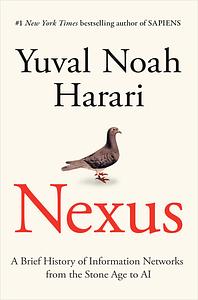Take a photo of a barcode or cover
1.02k reviews for:
Nexus: A Brief History of Information Networks from the Stone Age to AI
Yuval Noah Harari
1.02k reviews for:
Nexus: A Brief History of Information Networks from the Stone Age to AI
Yuval Noah Harari
challenging
informative
reflective
medium-paced
informative
reflective
challenging
dark
informative
tense
medium-paced
adventurous
dark
informative
mysterious
reflective
tense
medium-paced
Yuval Noah Harari is a masterful in story telling and connecting the dots (no pun intended). I like how he uses historical examples such as Witch hunt craze in Europe as evidence for his theory that just having access to more Information (as opposed to Wisdom or Knolwedge) is not going to save humanity.
Concerning Artificial Intelligence (AI) and the ever increasing likelihood that AI networks are en route to make a lot autonomous decisions (on our behalf or else), he raises a lot of valid concerning points which require immediate actions from scholars and regulatory bodies, e.g. proper AI regulations, making sure democracies can survive AI-infested tools, engineers building "baby" AI models that could evolve as they interact with us. Yet, I found his logic of "extrapolating" human past/present to a dystopian-esque future not deeply rooted in reality. He is right in that this is current period can be thought as the "infancy of AI". Yet, I could not relate to his arguments on (bad) adoption, integration, and (ab)use of AI systems at large scale causing doomsday scenarios easily.
I still highly recommend Harari's book. It includes recent and eye opening examples showing the remarkable power of online platforms such as Facebook and their role in promoting hate crime contents to masses with immediate impact, e.g. Rohingya's genocide in 2017.
Concerning Artificial Intelligence (AI) and the ever increasing likelihood that AI networks are en route to make a lot autonomous decisions (on our behalf or else), he raises a lot of valid concerning points which require immediate actions from scholars and regulatory bodies, e.g. proper AI regulations, making sure democracies can survive AI-infested tools, engineers building "baby" AI models that could evolve as they interact with us. Yet, I found his logic of "extrapolating" human past/present to a dystopian-esque future not deeply rooted in reality. He is right in that this is current period can be thought as the "infancy of AI". Yet, I could not relate to his arguments on (bad) adoption, integration, and (ab)use of AI systems at large scale causing doomsday scenarios easily.
I still highly recommend Harari's book. It includes recent and eye opening examples showing the remarkable power of online platforms such as Facebook and their role in promoting hate crime contents to masses with immediate impact, e.g. Rohingya's genocide in 2017.
challenging
informative
tense
slow-paced
Some chapters were a bit dull, but overall this topic was so interesting. If you want a shortened &very digestible version of this, he has a talk on youtube w/ Joseph Gordon Levitt.
Quotes.
“The government is already the most powerful institution in developed societies and it often has the greatest interest in distorting or hiding inconvenient facts. Allowing the governments to supervise the search for truth, is like appointing the fox to guard the chicken coop.”
“Democracies die not only when people are not free to talk, but also when people are unwilling or unable to listen.”
“For the survival of democracy, some inefficency is a feature not a bug. To protect the privacy and liberty of individuals, it’s best if neither the police nor the boss knows everything about us.”
“Knives and bombs do not themselves decide whom to kill. They are dumb tools, lacking the intelligence necessary to process information and make independent decisions. In contrast, AI can process information by itself, and thereby replace humans in decision making. AI isn’t a tool—it’s an agent.”
I think sitting with these thoughts was so heavy. Thinking about how google was never meant to be a free search engine, but was always designed to culminate information to become AI. Additionally, thinking about how AI could replace jobs that are essentially data collection like certain doctor specialties, but not nurses since those are task/care oriented. Also thinking about how AI can solve CAPTCHA because it studies how we solve CAPTCHA puzzles. And thinking about how social media platforms were once horrified with how the wrong news was disseminated through their platforms, but then realized it created traction and revenue so they decided to let it happen…
In the end, we create our own destruction. We did this. How do we move forward.
Quotes.
“The government is already the most powerful institution in developed societies and it often has the greatest interest in distorting or hiding inconvenient facts. Allowing the governments to supervise the search for truth, is like appointing the fox to guard the chicken coop.”
“Democracies die not only when people are not free to talk, but also when people are unwilling or unable to listen.”
“For the survival of democracy, some inefficency is a feature not a bug. To protect the privacy and liberty of individuals, it’s best if neither the police nor the boss knows everything about us.”
“Knives and bombs do not themselves decide whom to kill. They are dumb tools, lacking the intelligence necessary to process information and make independent decisions. In contrast, AI can process information by itself, and thereby replace humans in decision making. AI isn’t a tool—it’s an agent.”
I think sitting with these thoughts was so heavy. Thinking about how google was never meant to be a free search engine, but was always designed to culminate information to become AI. Additionally, thinking about how AI could replace jobs that are essentially data collection like certain doctor specialties, but not nurses since those are task/care oriented. Also thinking about how AI can solve CAPTCHA because it studies how we solve CAPTCHA puzzles. And thinking about how social media platforms were once horrified with how the wrong news was disseminated through their platforms, but then realized it created traction and revenue so they decided to let it happen…
In the end, we create our own destruction. We did this. How do we move forward.
The author makes many claims that aren’t conclusively explained, and the sources that are referenced at times don’t even contain or support these claims at all.
Good points and concepts related to AI, but boring and repetitive in parts.
challenging
dark
informative
reflective
tense
slow-paced
challenging
informative
reflective
slow-paced
informative
reflective





